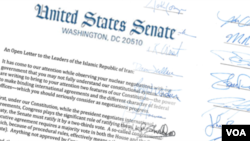Former U.S. Secretary of State Hillary Clinton said a letter by 47 Republican senators sent directly to Iran's government "was out of step with the best traditions of American leadership" and undermined sensitive, international talks with the Islamic Republic to curb its nuclear program.
"Either these senators were trying to be helpful to the Iranians or harmful to the commander-in-chief in the midst of high-stakes international diplomacy," Clinton said in a news conference Tuesday at the United Nations. "Either answer does discredit to the letter's signatories."
Clinton had served in the Senate, representing New York State, from 2001 until becoming the nation's chief diplomat in 2009, appointed by President Barack Obama.
Her comments added to those of Vice President Joe Biden and other Democrats chastising the Republican senators.
They said an open letter to the leaders of Iran signed by the lawmakers could damage the diplomatic talks, adding that it is a move tantamount to rushing to war with Tehran.
The letter comes just weeks before a late-March deadline for the so-called P5+1 world powers to reach a deal with Iran. Besides the United States, they include China, France, Germany, Russia and the United Kingdom.
Biden, who was a senator for 36 years, said the letter threatens to undermine the ability of future presidents to negotiate international agreements and "is beneath the dignity of an institution I revere."
"This letter sends a highly misleading signal to friend and foe alike that our commander-in-chief cannot deliver on America's commitments – a message that is as false as it is dangerous," Biden wrote in a statement late Monday.
He said the senators also offered "no viable alternative" to the ongoing nuclear negotiations.
The Republicans' letter warned any nuclear agreement could be modified or revoked once Obama leaves office in early 2017.
A prominent political scientist said that while the letter is extraordinary and unusual, it is legitimate for the lawmakers to write it.
Authored by freshman senator
The letter, authored by freshman Arkansas Senator Tom Cotton and co-signed by 46 other lawmakers, seeks to inform Iran’s leaders that any nuclear agreement involving the United States could face constitutional hurdles.
It states that, while the president can negotiate international agreements, Congress plays "a significant role" in ratifying them. It says a so-called congressional-executive agreement requires a majority vote in both the House of Representatives and the Senate, where a three-fifths majority of 100 senators is needed.
The letter also warned that any agreement regarding Iran’s nuclear weapons program that is not approved by the Congress will be viewed as nothing more than an executive agreement that could be revoked by a future president or modified by Congress.
Iran’s foreign minister, Mohammed Javad Zarif, denounced the letter Tuesday as having "no legal value" and dismissed it as "mostly a propaganda ploy." He said "the conduct of inter-state relations is governed by international law and not by U.S. domestic law."
"This kind of communication is unprecedented and undiplomatic," Zarif was quoted as saying by a state-run TV website. "In fact, it implies that the United States is not trustworthy" if any nuclear deal could be scrapped once Obama leaves office.
Zarif warned future revocation of any agreement "would be a blatant violation of international law."
Partisan divide
The letter seemed to harden partisan lines in the Senate, where Republicans will need Democrats' support to pass legislation now in the works to tighten sanctions on Iran or require congressional approval of a deal.
Senate Democratic Leader Harry Reid spoke out against the Republicans' "unprecedented" intervention in sensitive international negotiations "with the sole goal of embarrassing the president of the United States."
"This is a cynical effort by Republican senators to undermine sensitive international negotiations. It weakens America's hand and highlights our political divisions to the rest of the world," said Richard Durbin, the Senate's No. 2 Democrat.
A spokeswoman for Cotton said his office had invited several Democrats to co-sign but none had done so.
Senate Majority Leader Mitch McConnell's signature is on the letter; he said lawmakers should be suspicious of an administration that is intent on keeping Congress out of the emerging deal with Iran.
Several prospective presidential candidates also signed, including Republican Senator Marco Rubio of Florida. He said he would "sign the letter again tomorrow," calling it an extraordinarily important matter.
One Republican who did not sign was Senate Foreign Relations Committee Chairman Bob Corker. An aide said Corker is focused on getting a veto-proof majority to support his legislation, backed by both Republicans and Democrats, that would require Congress' authorization of an Iran deal.
Susan Collins of Maine also declined to sign. She told VOA that she didn't think the letter was appropriate and that she couldn't imagine the ayatollahs in Iran would care what Republican senators think.
Senate historian Don Ritchie told VOA it's highly unusual for lawmakers to write to a foreign leader disagreeing with the president.
Aligns party with Iran hardliners
Asked about the letter Monday, Obama said the U.S. lawmakers have aligned themselves with those in Iran opposed to the negotiations.
"I think it’s somewhat ironic to see some members of Congress wanting to make common cause with the hard-liners in Iran. It’s an unusual coalition," the president said. "I think what we’re going to focus on now is actually seeing whether we can get a deal or not and, if we do, then we will be able to make the case to the American people, and I’m confident we’ll be able to implement."
Sunday, Obama acknowledged that gaps in the negotiating positions remain before a self-imposed, month's-end deadline to reach a framework agreement. He warned he would walk away from the talks without proper transparency and verification that Iran is not pursuing a nuclear weapon.
'Partisan strategy'
White House spokesman Josh Earnest said the letter represents "a partisan strategy to undermine the president’s ability to conduct foreign policy" and advance U.S. national security interests.
"We have heard Republicans now, for quite some time, including the principal author of this letter, make clear that their goal is to undermine these negotiations," Earnest said.
State Department spokeswoman Jen Psaki said that the letter is designed "to score political points” and that Congress doesn’t have the power to alter the terms of international arrangements negotiated by the executive. She said any agreement reached would not be a treaty requiring Senate ratification.
Also, this is "a negotiation. It’s important for us to send this message to our partners around the world that it is with not just the United States and Iran, but with France, Germany, the United Kingdom, the European Union, China and Russia," Psaki said.
Unusual, not out of bounds
Larry Sabato, a political science professor at the University of Virginia, said the letter by U.S. lawmakers to a foreign government is both extraordinary and unusual, and represents an escalation of the political battle started last November when Republicans took control of both houses of Congress following elections.
"They can’t pass much because they don’t control Congress. They don’t have sufficient numbers in either the House or the Senate to be able to overcome their factionalism or the Senate rules," Sabato said. "But, what they do have is the ability to send a letter like this and affect negotiations on a major treaty or executive agreement."
He said the letter can be criticized on the basis of judgment, but it is not outside the boundaries of the Constitution.
"In fact, because the legislature is a co-equal branch of government, it is completely legitimate for them to do this. Whether it is wise is another question," Sabato said.
He added that if any agreement reached with Iran is not submitted to the Senate as a treaty, it will be treated as an executive agreement, which can be revoked by a succeeding president. He added he has no doubt Iran's leaders are making that part of their calculus.
Sabato said that if Obama wishes any nuclear agreement with Tehran to last, he would have to submit it to the Senate for ratification.
VOA's Cindy Saine contributed to this report. Some material also came from The Associated Press and Agence France-Presse.






